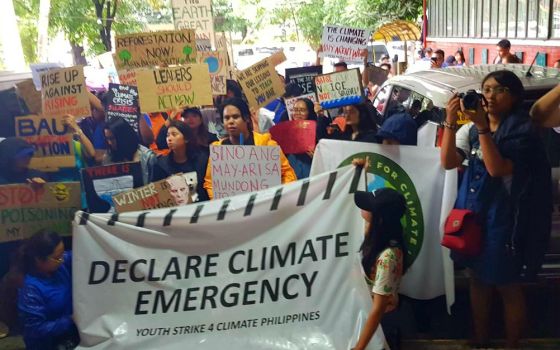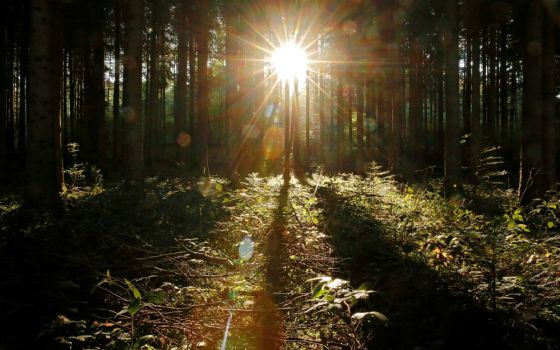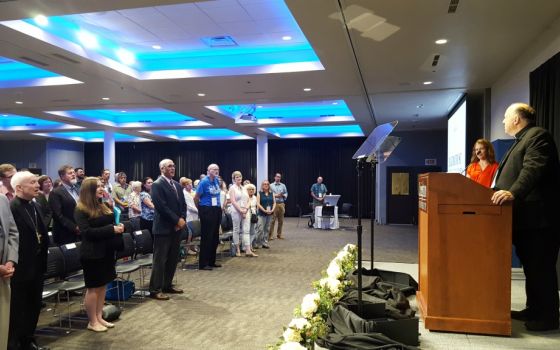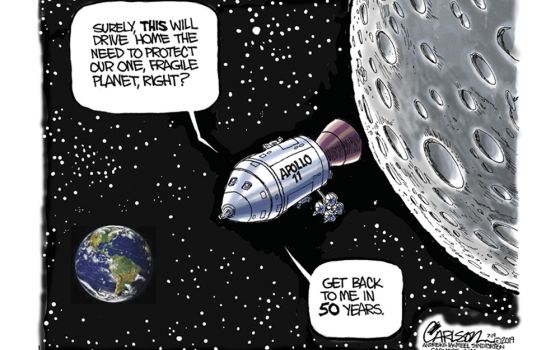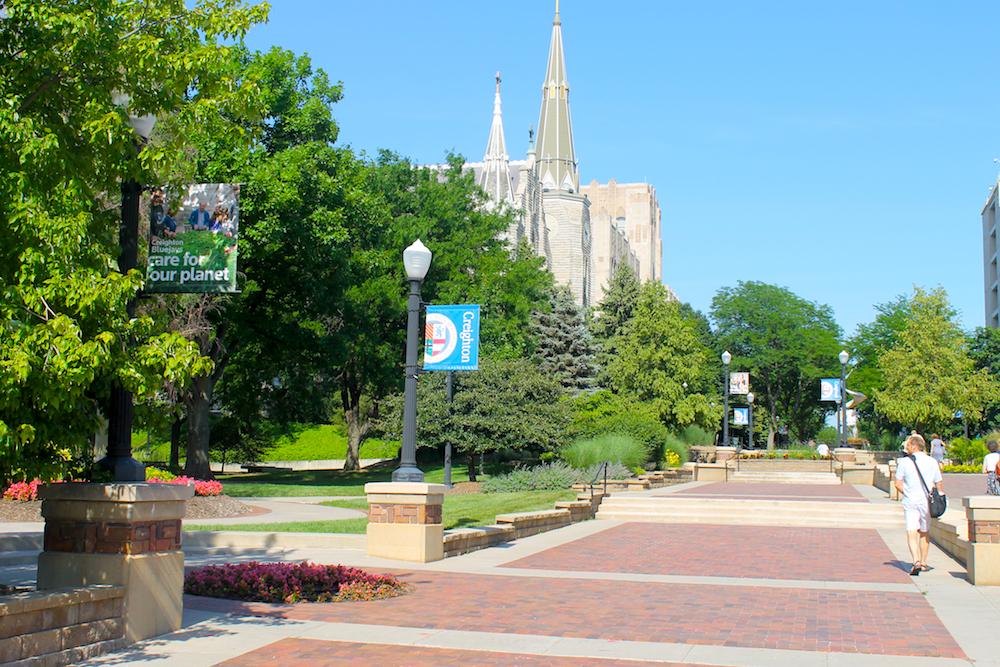
Campus of Creighton University in Omaha, Nebraska, where "Laudato Si' and the U.S. Catholic Church" was co-sponsored by the Catholic Climate Covenant. (NCR photo/Brian Roewe)
As the designated scribe, Danielle Roberts raced to keep pace writing down the ideas other young Catholics offered up as they envisioned a U.S. church more embracing the ecological tenants of their faith.
In all, four large white sheets of paper displayed bold ideas young Catholics proposed for turning their church toward the environmental concern, particularly on climate change, that Pope Francis called for with his 2015 encyclical "Laudato Si', on Care for Our Common Home."
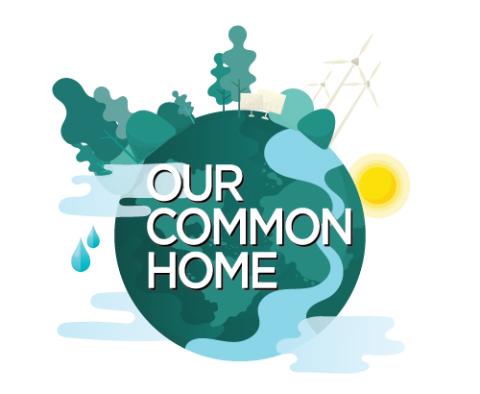
(NCR/Freepik)
Dioceses and Catholic universities going carbon neutral. College campuses divesting from fossil fuels. A set of "Laudato Si' standards" for parishes and dioceses to adopt, with an app to track progress. People no longer asking if you've read the pope's apostolic letter, the first ever focused on the environment.
The brainstorming was one of the final sessions of an inaugural conference series co-sponsored by the Catholic Climate Covenant and Creighton University that aims to integrate Laudato Si' and its messages on creation care more deeply into the daily experience of Catholics in America.
In a sense, to find ways to turn the big ideas into a more widespread reality.
The June 27-29 conference at Creighton, titled "Laudato Si' and the U.S. Catholic Church," represented one of the most significant efforts by the U.S. church to take up the pope's now-four-year-old document. Follow-up conferences are set for 2021 and 2023.
The intentional effort to breathe fuller life into Laudato Si' represented something of a full-circle moment for the Covenant, which formed in 2006 as part of an effort to more widely implement the U.S. bishops' own 2001 document on climate change.
In the time since, the effects of a warming planet have become clearer. Scientists have said that climate change was a contributing factor to flooding that devastated parts of the Midwest this spring — including areas outside Omaha where some farm fields remain under water — in that warmer ocean waters led to a warmer atmosphere capable of dropping more significant rainfall all at once.
Just two weeks before the U.S. Catholic climate conference, Francis told oil and energy executives at the Vatican the world is facing a "climate emergency" that requires immediate and direct action.
"I think it's a really interesting time," said Roberts, a program officer for university engagement with Catholic Relief Services who co-led the discussion on young adult ministry. "We talk about this being really a turning point in the climate change movement overall, and in the need to really take action."
Papal words to Catholic action
Action was front and center throughout the three days on the Creighton campus.
More than 200 participants invited by organizers shared experiences and resources of what's worked, and what hasn't, in their efforts to drive greater ecological awareness within their local church communities. Eight breakout tracks explored such topics as advocacy, energy management, liturgy, adult faith formation, young adult ministry, school education, higher education and creation care teams. Two additional sessions focused on Hispanic ministry and environmental justice.
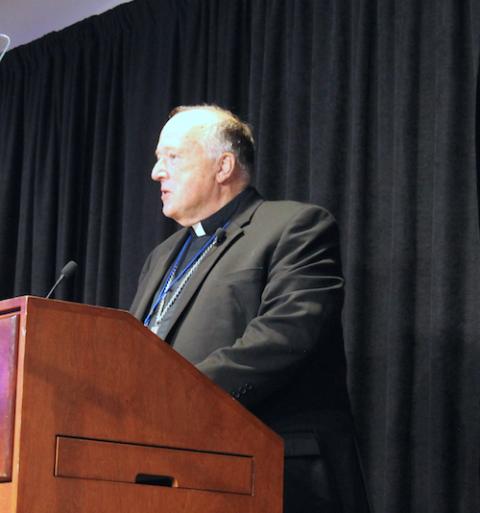
San Diego Bishop Robert McElroy gives the opening address at "Laudato Si' and the U.S. Catholic Church." (NCR photo/Brian Roewe)
The groups examined best practices and what could be expanded so that the church could contribute more in mitigating the worst impacts of climate change.
In the opening keynote, San Diego Bishop Robert McElroy said that estrangement — from God, from nature, from one another and even from truth itself — today "reverberates through our relationship with the Earth that is our common home."
"For us in the United States at this perilous moment in our national history, the core themes of Laudato Si' are especially urgent. We stand, deeply estranged from one another, seething in divisions and unwilling to reconcile," McElroy said. "We are the most powerful nation in the history of the Earth yet have rejected the only realistic pathways that have emerged to heal our broken planet."
Attendees from across the country spanned a range of ministries, backgrounds and ages, with a sizeable number of young Catholics. Among them were scientists, energy experts, environmental leaders, campus ministers, activists, liturgists, clergy and religious, and staff from several state Catholic conferences, along with the U.S. Conference of Catholic Bishops, three bishops and a representative from the Vatican.
Many brought their own stories, whether successes in lowering their institution's carbon footprint or in giving life to the church's extensive environmental teachings. For some, it was both.
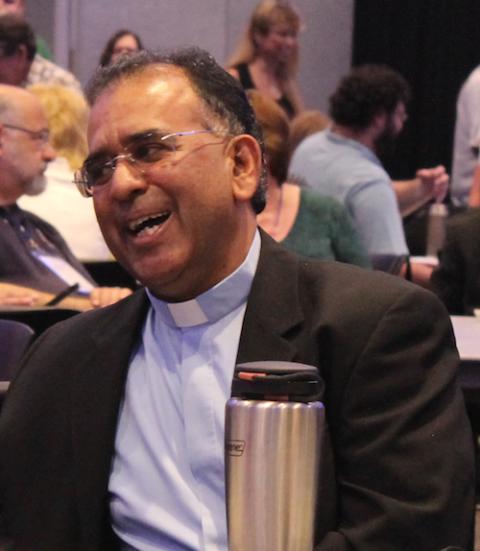
Salesian Fr. Joshtrom Isaac Kureethadam, coordinator for the ecology and creation sector of the Vatican Dicastery for Promoting Integral Human Development (NCR photo/Brian Roewe)
Martin Susz, who co-led the energy management track, shared how the New York Archdiocese has completed more than 70 energy efficiency projects in its parishes. Mercy Sr. Carolyn McWatters described how the religious order made the moral argument for the Mercy Health system to eliminate bottled water its facilities in four states. Two young staffers with the Southeast Pastoral Institute, a Hispanic ministry of the bishops of the Southeast, shared outreach efforts to Hispanic Catholics around environmental issues.
"Hispanics are concerned about care for creation; Hispanics want to work on care for creation," said Nelson Araque, a Catholic high school teacher from south Florida who led the Hispanic ministry discussions. He hoped the conference would yield more Hispanic-focused resources, and perhaps a Hispanic speaker at one of the future gatherings.
Each of the breakout tracks created reports they shared with Catholic Climate Covenant summarizing their conversations as well as ideas for next steps. Going forward, Covenant staff plan to distill that feedback, said executive director Dan Misleh, with the hope to develop new programs and resources, "and see how we can more fully integrate Laudato Si' into the Catholic community."
In a letter to the conference, the papal ambassador to the U.S. Archbishop Christophe Pierre expressed Francis' "hopes that this conference and the ones that will follow will not only contribute to the ongoing conversation on climate change, but foster the greater involvement of all society in seeking" comprehensive, integrated solutions that protect nature and address poverty and exclusion
Addressing the conference June 28, Salesian Fr. Joshtrom Isaac Kureethadam, coordinator for the ecology and creation sector of the Vatican Dicastery for Promoting Integral Human Development, said that the Vatican believes that "2020 can be a turning point" for global action on climate change.
Advertisement
He said the Holy See has begun exploring a number of possibilities for the encyclical's fifth anniversary, which coincides with the 50th anniversary of Earth Day. He reminded conference-goers that the U.S. has long led on environmental issues, and "with God's providence," could lead again.
"We are the last generation that can really do something … so we have to act," Kureethadam said.
Still quiet clergy
The conference had no shortage of energy or optimism. Still, those in attendance expressed a feeling that widespread ecological conversion within the U.S. church won't happen without a more vocal clergy on creation care — and particularly from the pulpit.
"For the folks who are still Mass-goers, coming together on Sunday is the place where they find out about things going on in church in the world, and where we have the greatest opportunity to influence people," said McWatters, the liturgy and music director at St. Francis Xavier College Church at Saint Louis University. "For better, for worse, that's our time."
Throughout discussions, frustration revolved around the bishops. Though some individual bishops have taken strides — and in the case of California, a pastoral statement on Laudato Si' issued by all its bishops — the sense was the full body has yet to stake a more visible leadership position on climate change.
"I think part of the issue that we've been talking about is how the bishops have been pretty quiet on this," said Aaron Salzman, an incoming senior at Boston College and leader in the Catholic Divestment Movement. "And in lieu of their response to this crisis, I think what we see here is a lot of engaged lay people."
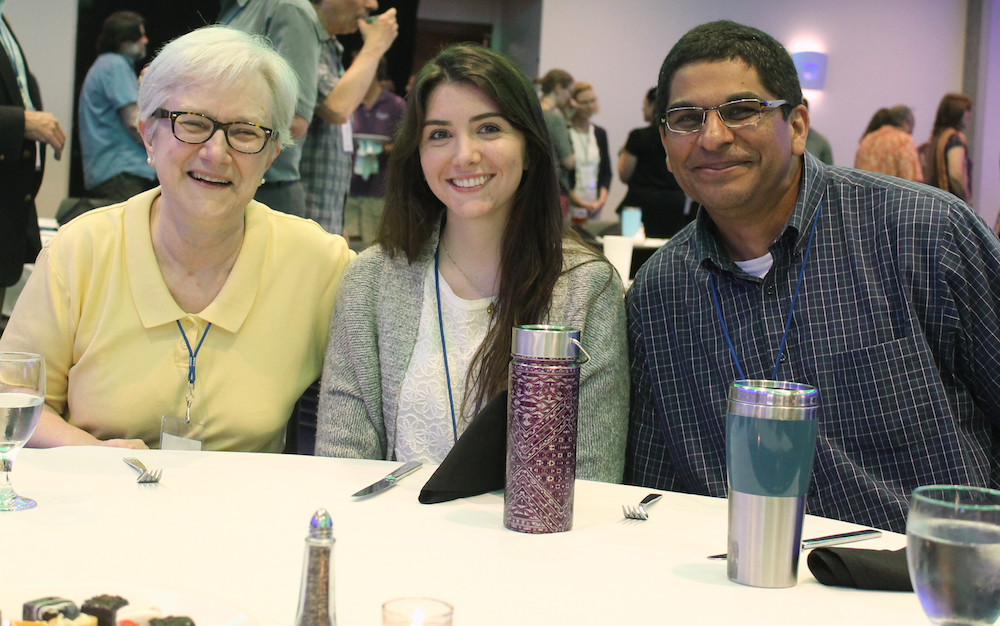
Franciscan Sr. Dawn Nothwehr of Catholic Theological Union, Katie Starasinich and Nelson Araque participate in discussion at the conference. (NCR photo/Brian Roewe)
McElroy, who attended all three days of the conference, said he didn't disagree with the assessment of the bishops, but characterized it as a question of focus: that while few bishops would challenge elements of Laudato Si', differences emerge when it shifts to priority and strategy.
In an interview, he told NCR that he believes the pope's encyclical should have a more central place within the bishops' conference, noting that the devastation that climate change could mean for the planet also poses serious threats to human dignity.
"It's so mammoth in its consequences that it has a rightful claim to a top priority," he said.
The first night highlighted several environmental legislative priorities for the bishops on Capitol Hill. Megan Goodwin, associate director of the U.S. bishops' conference government relations office, described the support for two bipartisan bills: in the House, a carbon dividend proposal and in the Senate, a measure on energy efficiency in non-profits.
Goodwin urged Catholics to raise environmental policy with political candidates early and often, so that the environment doesn't become a wedge issue that divides lawmakers along party lines. "The fastest way for a lack of meaningful action on any issue is for it to become a wedge issue."
Apart from legislation, Goodwin described the work of the bishops' domestic and overseas development work to assist those facing the consequences of environmental degradation.
In one instance, a grant from the Catholic Campaign for Human Development helped a student-led group in south Baltimore, already living with some of the worst toxic air emissions in the country, in their stand to block plans to build the nation's largest trash incinerator less than a mile from their school.
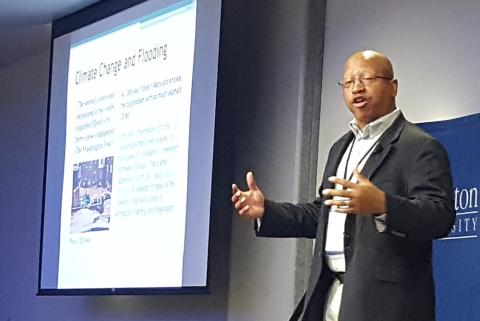
Sacoby Wilson, associate professor of applied environmental health at the University of Maryland (NCR photo/Brian Roewe)
That victory for the Curtis Bay neighborhood, which earned one student the Goldman Environmental Prize in 2016, showed the impact a few can have in opposing environmental injustice, said Sacoby Wilson, an associate professor of applied environmental health at the University of Maryland. He challenged those gathered to engage their own communities and form relationships with groups like the NAACP working to combat environmental racism.
Said Goodwin: "As Catholics first, we need a spiritual renewal that embraces radical inclusion, especially for the poor, the marginalized and the most vulnerable, with intentionality in our behavior as it impacts the Earth."
'I need to do something'
In her closing speech, Adrian Dominican Sr. Patricia Siemen made the case for the importance of stories in bringing about ecological conversion, citing Jesus' use of parables.
"The challenge for all of us is to tell stories that invite others to enter into an experience of wanting to become involved in protecting creation and our ecological world," she said.
Sieman, a civil attorney who founded the Center for Earth Jurisprudence at Barry University School of Law, asked the conference participants to consider what brought them to Creighton to spend a weekend ingrained in matters of ecology and faith.
For Katie Starasinich, her journey began when she attended a talk in the Diocese of Joliet, Illinois, on last year's synod on youth and young adults. That inspired the environmental sustainability major to take a Laudato Si' animator course from the Global Catholic Climate Movement, which led her to connect with others engaged in environmental issues in her home diocese. Which ultimately led her to Omaha.
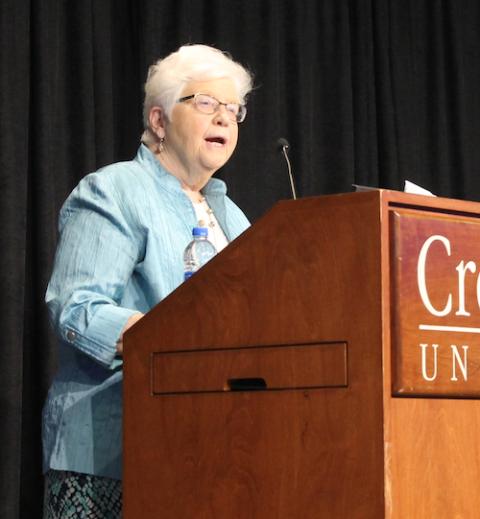
Adrian Dominican Sr. Patricia Siemen, founder of the Center for Earth Jurisprudence at Barry University School of Law (NCR photo/Brian Roewe)
"We are the protagonists of the church, and we are the now," she told NCR. "So I think that that is something that resonates with me. That I can really make a difference; I need to do something."
McElroy stressed the importance of empowering young people as "the prophetic voice of environmental justice in our nation," capable of opening the minds of their elders to the damage being inflicted by climate change on future generations.
"Our parishes and schools must become centers of truth-telling about the threats to God's creation, which are indisputably rising in our world," the San Diego bishop said. "And we must call our own nation particularly into account, that we have let the United States, which has for so long been the leader in scientific inquiry, to countenance the wholesale spread of pseudo-science created by and in service to those industries and economic interests that despoil our planet."
But for all the consensus that climate change posed a crisis, how best to talk about it with those less convinced was a topic of debate.
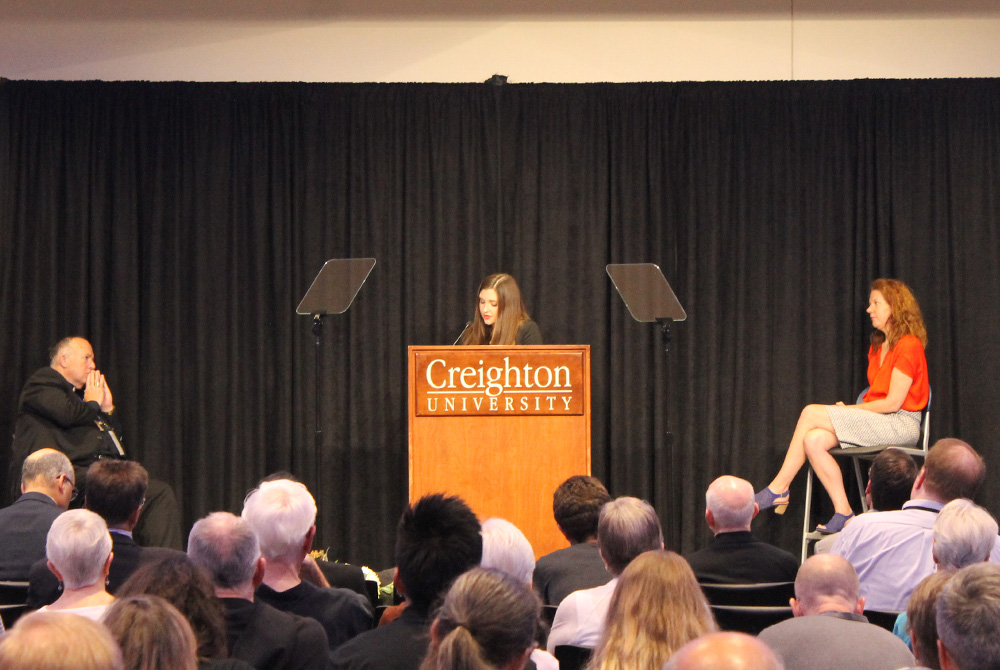
Megan Goodwin, associate director of the U.S. bishops' conference government relations office, speaks during the first "Laudato Si' and the U.S. Catholic Church" conference on June 27, 2019. Listening on stage were San Diego Bishop Robert McElroy and Martha Shulski, the Nebraska state climatologist. (NCR photo/Brian Roewe)
According to a 2018 survey by Pew Research Center, 60 percent of Catholics acknowledge the world is warming mostly due to human activitiy. But a greater divide appears among those attending Mass weekly, who are least likely to view climate change as a serious problem or one requiring a moral response on their part, according to a 2017 study by the Center for Applied Research in the Apostolate at Georgetown University.
Erin Lothes, a theologian specializing in energy ethics at the College of St. Elizabeth in Morristown, New Jersey, cited that study as she argued against combative arguments about climate change and instead positive communication that emphasize solutions, such as an impromptu presentation about Immaculate Conception Church in southeastern Virginia's recent transition to 100% solar power.
After all, it was the search for solutions to a more eco-conscious church that brought them to Creighton in the first place.
"In a church, norms spread," Lothes said. "New practices that people share pass from one to another. That's why it's so important to talk about what you're doing."
[Brian Roewe is an NCR staff writer. His email address is broewe@ncronline.org. Follow him on Twitter: @BrianRoewe.]





